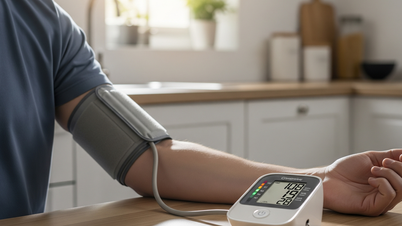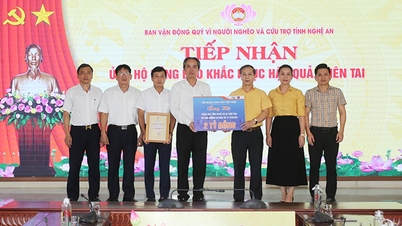
Experts recommend increasing taxes to reduce the use of sugary drinks - Illustration: QUANG DINH
One of the main causes of this situation is the excessive consumption of sugary drinks, a seemingly harmless food that actually poses many health risks.
Recently, after two weeks of continuously drinking milk tea and soft drinks, Mr. TTĐ. (28 years old, in Hanoi ) had to be hospitalized due to difficulty breathing, heart failure, and inability to move.
Sugar - harmful effects are not just weight gain
At the Central Endocrinology Hospital, doctors recorded his weight as 175kg and he was diagnosed with a series of metabolic diseases such as obesity, chronic gout, heart failure, and edema.
Especially sleep apnea syndrome - a common condition in overweight people. Just two weeks before being hospitalized, he had gained more than 10kg due to drinking a lot of milk tea and soft drinks.
Previously, a 20-year-old male patient with a history of diabetes also had to be admitted to Bach Mai Hospital for emergency treatment in a state of acute hyperglycemia.
This young man was previously diagnosed with grade 1 obesity and was prescribed a diabetic diet. However, he had a habit of drinking carbonated soft drinks, an average of about 2 liters/day. Finally, because of his "passion for sweets", the young man had to be hospitalized for emergency treatment.
According to the Ministry of Health , sugary drinks including carbonated soft drinks, milk tea, bottled juice, energy drinks... are "empty" sources of energy, containing many calories but lacking essential nutritional value.
A 330ml can of soft drink contains about 35g of sugar, equivalent to seven teaspoons. Meanwhile, the recommended daily sugar intake for adults is 25g. Drinking one can of soft drink per day for 1.5 years can increase the risk of being overweight or obese by 60% and if you regularly drink 1-2 cans per day, the risk of type 2 diabetes increases by 26%.
This situation is evident among young people. Data from the National Institute of Nutrition shows that in 2020, the rate of overweight and obese students in big cities like Hanoi and Ho Chi Minh City reached 40%. In the 15-19 age group, one in four students is overweight or obese.
Ms. Dinh Thi Thu Thuy - Deputy Director of the Department of Legal Affairs, Ministry of Health - said that research in 75 countries showed that a 1% increase in sugary beverage consumption would result in nearly 5 overweight adults per 100 people and more than 2 obese adults per 100 people; mainly in low- and middle-income countries.
This study also identified that high consumption of sugary drinks in childhood is associated with an increased risk of overweight and obesity.
Regular use of sugary drinks increases the risk of metabolic disorders such as type 2 diabetes, cardiovascular disease, high blood pressure, gout, increases the risk of oral diseases, and negatively affects bone health.
"Consuming a lot of sugary drinks is a major cause of the increase in global obesity rates and diet-related non-communicable diseases," Ms. Thuy emphasized.
Why are sugary drinks harmful?
Ms. Truong Tuyet Mai, deputy director of the National Institute of Nutrition, said that unlike sugary foods in solid form, sugar in drinks exists in liquid form, making the absorption process in the body happen much faster.
"This causes blood sugar levels to spike in a short period of time, disrupting blood sugar regulation and promoting fat accumulation.
The harmful effects of sugary drinks do not only affect a single organ but also many different organs in the body. When consumed in excess, sugary drinks not only increase the risk of metabolic diseases but also contribute to chronic inflammation and long-term health problems," Ms. Mai analyzed.
She also said that sugary drink consumption is increasing rapidly. According to statistics, sugary drinks account for up to 25% of free sugars in the diet of adults and up to 40% in adolescents.
Notably, half of the free sugars in ultra-processed foods come from carbonated drinks and nearly a fifth come from fruit juices and other sugary drinks.
Solutions from policies, raising public awareness
According to Dr. Nguyen Tuan Lam - World Health Organization (WHO) in Vietnam, it is necessary to reduce free sugar consumption throughout life.
Both adults and children should reduce their intake of free sugars to less than 10% of total daily energy intake, equivalent to 12 teaspoons of sugar. It is best to further reduce free sugar intake to less than 5% (6 teaspoons) of total energy intake for additional benefit.
Recently, the Ministry of Health, WHO and many other health organizations have all expressed the need for solutions to limit the use of sugary drinks. According to Ms. Angela Pratt - WHO representative in Vietnam, soft drink consumption is not only a problem in Vietnam but is becoming a global concern.
Just one can of soft drink a day provides 140kcal but does not bring any nutritional value. It even brings a series of health risks.
Ms. Mai also recommends that people change their consumption behavior, prioritize filtered water, unsweetened milk, eat in moderation and increase physical activity. Avoid overusing sweetened bottled drinks, including industrial fruit juices, which contain significantly high amounts of sugar.
To limit consumption, many countries have implemented strong measures to control the consumption of sugary drinks. According to Dr. Hoang Thi My Hanh - Institute of Strategy and Health Policy, to date, more than 110 countries have imposed taxes on soft drinks.
In Vietnam, the Ministry of Health and WHO recommend imposing excise taxes on sugary drinks, hoping to increase prices by 20% or more to reduce purchasing power, a strategy that has proven effective in many countries.
"In addition to increasing taxes, other measures should be taken such as warning labels, limiting advertising (especially to children), not selling in schools, and increasing communication to change consumer behavior," Dr. Hanh recommended.
Source: https://tuoitre.vn/tu-tra-sua-nuoc-ngot-den-benh-tat-bua-vay-20250617095513468.htm







![[Photo] Closing of the 13th Conference of the 13th Party Central Committee](https://vphoto.vietnam.vn/thumb/1200x675/vietnam/resource/IMAGE/2025/10/08/1759893763535_ndo_br_a3-bnd-2504-jpg.webp)

























































































Comment (0)